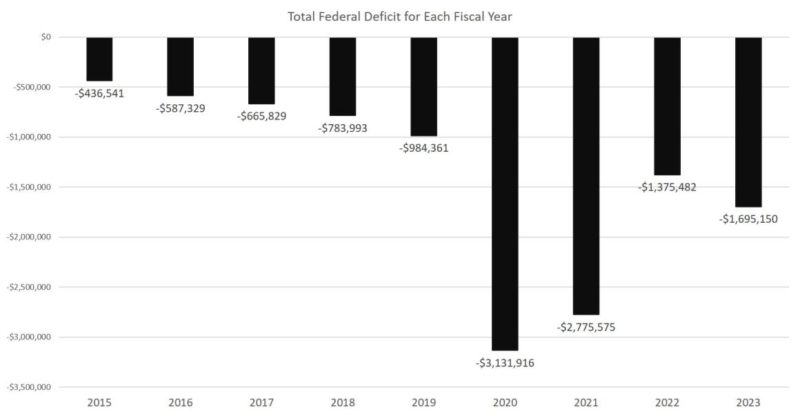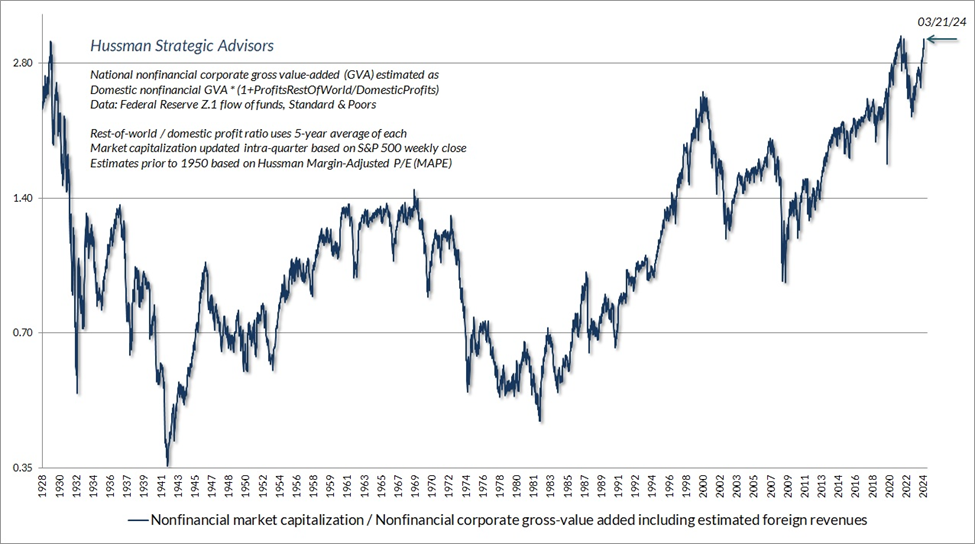Category Archive: 6b.) Mises.org
Statist Ideology and War: Israel versus Hamas
As I wrote in my previous piece on statism and the Israel-Hamas conflict, states are organized crime rackets. Wars between states thus represent warfare between rival gangs. The proper libertarian position with reference to such gang wars is neutrality, or the opposition to all state parties to war. Neutrality includes opposition to interventionism, including opposition to sending arms and aid to other nations. Foreign aid increases the tax...
Read More »
Read More »
The Oil Price-Stock Market Connection, the 100 Year Financial Cycle, and the Next Crash
Recorded at the Mises Circle in Fort Myers, Florida, 4 November 2023.
Special thanks to Murray and Florence M. Sabrin for making this event possible.
The Oil Price-Stock Market Connection, 100 Year Financial Cycle, and the Next Crash | Murray Sabrin
Video of The Oil Price-Stock Market Connection, 100 Year Financial Cycle, and the Next Crash | Murray Sabrin
Read More »
Read More »
The Radical Uncertainty of a Polymorphic Fed
Recorded at the Mises Circle in Fort Myers, Florida, 4 November 2023. Includes audience question and answer period.
Special thanks to Murray and Florence M. Sabrin for making this event possible.
The Radical Uncertainty of a Polymorphic Fed | Jonathan Newman
Video of The Radical Uncertainty of a Polymorphic Fed | Jonathan Newman
Read More »
Read More »
The “Climate Emergency”: Fueled by 21st Century Marxism
Europe currently faces several challenges that potentially harm the quality of life for people in general but especially for young individuals, preventing them from developing their lives autonomously and independently. The housing crisis, reflected in overcrowded accommodation affecting 28 percent of young people aged 15 to 29, is just one example.
Freedom of expression in Europe also seems more threatened than ever. Highly controlled content is...
Read More »
Read More »
Is a Welfare State Consistent with Libertarianism?
David Gordon reviews Dan Moller's book Governing Least: A New England Libertarianism, in which the author examines the issue of a welfare state in a libertarian society.
Original Article: Is a Welfare State Consistent with Libertarianism?
Read More »
Read More »
How Washington Hawks Helped Create the New “Axis of Evil”
In 2002, President George W. Bush cited the now famous “axis of evil”—Iraq, Iran, and North Korea—as he tried to get the American people to look beyond those responsible for the 9/11 attacks and greenlight a global military campaign to “rid the world of the evil-doers.”
The result was the $8 trillion global war on terror that continues to this day.
Now, in the wake of the Hamas attacks in southern Israel one month ago, the same language is being...
Read More »
Read More »
What is Software Quality? An Austrian Approach
Even something that seems as objective as software development falls under the Austrian view of subjective utility.
Original Article: What is Software Quality? An Austrian Approach
Read More »
Read More »
Rothbard: Understanding the History of Banking from an Austrian Perspective
A History of Money and Banking in the United States:
The Colonial Era to World War II
by Murray N. Rothbard
Edited with an Introduction by Joseph T. Salerno
(Auburn, Alabama: Ludwig von Mises Institute, 2002; 510 pages)
A History of Money and Banking in the United States comprises a collection of essays written by Murray N. Rothbard and compiled and edited by Joseph T. Salerno. It is the most comprehensive and enlightening treatise on the history...
Read More »
Read More »
There’s No Easy Way Out of This Debt Spiral
We're about six weeks into fiscal year 2024, but if this year looks anything like last year, we can assume the federal government will continue to pile up debt at astonishing rates.
According to the September Monthly Treasury report, the US government accumulated an additional 1.7 trillion dollars in debt for the 2023 fiscal year, which ended October 31. That' up by $319 billion, or 23 percent, from the 2022 fiscal year. As recently as June,...
Read More »
Read More »
Israel Isn’t the Brilliant Friend of Freedom the Beltway Claims It to Be
It certainly wasn’t the only time calling a perceived ally of DC a democracy became a tradition with India. While India could have been the first non-European “ally” to receive such treatment since the heydays of the Cold War, the immense support India currently enjoys despite a litany of human rights violations will never outclass the kind of prowess Tel Aviv has from the grassroots and political elite in the Beltway. Between the dying enthusiasm...
Read More »
Read More »
Fighting the Surveillance State Begins with the Individual
Fed up with the state's surveillance regime? There are ways to use available technology to frustrate government efforts to spy on you.
Original Article: The Parasitic Rich Men North of Richmond
Read More »
Read More »
The Federal Reserve is Running Losses. Does This Cost Anyone Anything?
Financial statements of the US Federal Reserve, which consists of the board of governors in Washington and twelve district reserve banks across the country, indicate that the consolidated system has generated both capital and operating losses for the past couple of years. The Fed was created in 1913 to issue and circulate an “elastic currency” that could respond to consumers’ demand for cash, end bank runs known then as “money panics,” and serve as...
Read More »
Read More »
Killers of the Flower Moon Is about Government Failure
Most reviewers of the motion picture Killers of the Flower Moon distill just one lesson from the story: greed is deadly. The love of money leads to evil. But the real lesson should be of government failure.
The movie follows the book, Killers of the Flower Moon: The Osage Murders and the Birth of the FBI by David Grann. It tells the story of the Osage tribe during the 1920s oil boom in Oklahoma. Tribal members became very wealthy because of the...
Read More »
Read More »
The Parasitic Rich Men North of Richmond
Oliver Anthony's popular song, "Rich Men North of Richmond," describes the parasitic world of the Beltway. One hopes people understand the damage the political classes have done.
Original Article: The Parasitic Rich Men North of Richmond
Read More »
Read More »
Is Migration a Tool of the Consumptive Class?
Migration is part of the wider concept of economic freedom. This makes it desirable if prosperity is the goal of policy. But more applicable to the current attitudes and values of Western leaders than mundane economic arguments, migration presents an opportunity to increase the pool from which they extract real income. This is required in the face of poor demographics and growing socialistic ambitions.
The extraction is achieved by taxation and...
Read More »
Read More »
Rothbard, Milei and the New Right in Argentina
Instead of the usual statist candidates, Argentine voters have to opportunity to elect a Rothbardian who is calling for radical free-market changes in the nation's economy.
Original Article: Rothbard, Milei and the New Right in Argentina
Read More »
Read More »
The Interest Rate Shock Will Blow Up the Government’s Ponzi Game
In the international fixed-income markets, interest rates are rising, and the decades-long trend of declining bond yields has undoubtedly been broken. On August 2, 2022, the ten-year United States Treasury yield was 0.5 percent; on October 9, 2023, it had risen to 4.8 percent. Long-term interest rates in Europe, Asia, and Latin America have also risen sharply. The key reason for the rise in capital market interest rates is the central banks’...
Read More »
Read More »
Can Electricity Providers Promise 100 Percent Green Energy? Probably Not.
Residential electricity sources are becoming yet another form of “virtue signaling.”
Original Article: Can Electricity Providers Promise 100 Percent Green Energy? Probably Not.
Read More »
Read More »
Destroying Liberty Through State Protection: The First Amendment
Leave it to government judges and politicians to turn constitutional protections of free speech into new ways to centralize and grow state power.
Original Article: Destroying Liberty Through State Protection: The First Amendment
Read More »
Read More »
Monetary Chaos
On this week's episode, Mark addresses how we the people can prevent the government and the Federal Reserve from grabbing more power and implementing their own preferred "solutions" to economic issues. This is the third round of monetary chaos the Fed has subjected us to in recent history—a history from which valuable lessons can be learned.
Be sure to follow Minor Issues at Mises.org/MinorIssues.
Read More »
Read More »



























